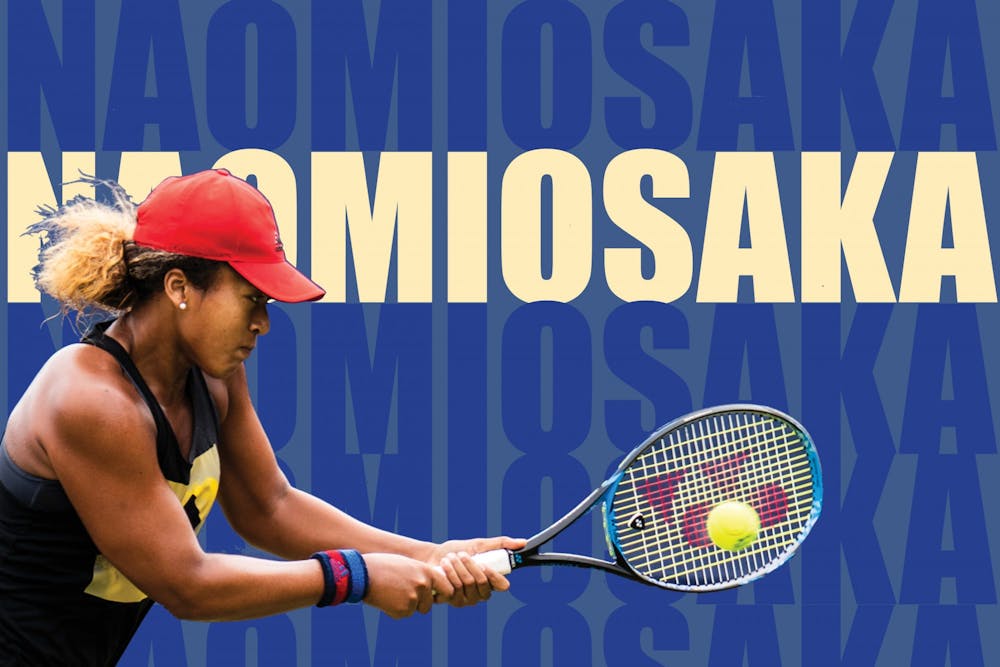Content Warning: The following text contains mentions of depression and suicide, which can be disturbing or triggering for some readers. Please find resources listed at the bottom of the article.
Naomi Osaka is 23. I’m only three years younger than her but have four less Grand Slam titles to my name. If I had to exist in the same room as tennis icon Serena Williams, I’d probably cry from getting overwhelmed, ask for a picture, and then immediately leave out of embarrassment that I just cried. So, it’s hard to even imagine playing against her, and even more ludicrous to think about winning in straight sets. Twice.
Osaka has accomplished this with her 2018 US Open and 2021 Australian Open titles before many people even graduate college. True, not everyone can be a professional athlete. It takes more than sheer athleticism; every great athlete needs drive, unrelenting dedication, and relatively thick skin. But at what point do we admit that these talented and strong athletes are just people too, with the ability to feel the immense pressure surrounding public competition?
There’s no contest as to whether or not Osaka is a great athlete. But after incurring a $15,000 fine for skipping a post–match media conference and subsequently dropping out of the French Open, Osaka has now come under fire as the de facto face of the professional athlete mental health debate.
Osaka released a statement on her Twitter account explaining her decision to withdraw from the tournament, revealing she has “suffered long bouts of depression since the US Open in 2018 and I have had a really hard time coping with that.” She also clarified that her press duties as a professional athlete have exacerbated her pre–existing social anxiety; she had been feeling particularly vulnerable during her time in Paris and skipped the French Open press conference to prioritize self–care.
Tennis legends like 18–time Grand Slam champion Martina Navratilova have come out in support of Osaka and her decision to focus on mental health, alongside other pro athletes from different sports like Steph Curry, a Golden State Warriors’ NBA point guard. Navratilova noted that while athletes are taught to focus on their physical body, there’s never a similar focus on maintaining a healthy mind.
Despite the outpouring of solidarity, Osaka still faces criticism from detractors who think her decision is a sign of weakness. Beyond digs labeling her “princess–like,” others have called into question whether or not Osaka’s mental health can handle the tough demands of professional sports. For instance, former tennis star Boris Becker, although sympathetic to Osaka, worried that “she couldn’t cope with the pressures of facing the media, especially after she loses a match ... that happens frequently and you have to deal with it.” Becker went on to say that her struggles with mental health could effectively end her career if she isn’t able to power through her anxiety.
While interacting with the media and operating within the public sphere is considered part of a pro athlete’s job—after all, it’s how they snag sponsorships and cultivate a relationship with fans—mental health shouldn’t play a role in the perception of Osaka’s athletic ability or bar her from competing. Becker, while partially correct about the immense pressure tied to every single match, win or lose, is stuck in a mindset from his 1980s tennis days. Osaka isn’t the most outwardly bold public speaker and doesn’t bask in the limelight—but since when is that mutually exclusive with athleticism?
Osaka’s decision to prioritize mental health is one that the professional sports environment should heavily consider. Despite the feats of strength we may watch on television, athletes are not superhuman. This is particularly important to keep in mind when considering Osaka’s situation, given her extremely rocky catapult to the headlines because of her controversial 2018 US Open win. Osaka, who was 20 at the time, had just defeated Serena Williams to snag her first Grand Slam title; in response, she was met with booing and jeering from the crowd when she was announced the winner.
Osaka’s victory was marred by arguments between the chair umpire and Williams about violations for supposedly communicating with her coach via hand signals and smashing her racket during the match. Watching Williams try to comfort Osaka as tears welled in her eyes during her first Grand Slam ceremony, a usually joyful procession, is still hard to watch.
The resulting controversy from Osaka’s surprise upset thrust her into the global spotlight in a highly unconventional and uncomfortable manner. Instead of basking in her accomplishments in front of all those people and cameras, Osaka likely felt defeated by the crowd’s reception and the stench of the match’s controversy. The headlines from 2018 covering her subsequent wins, “Naomi Osaka forgets her victory speech after Australian Open” and “All eyes on Osaka,” probably didn’t help relieve the immense pressure or emotional burden either.
The truth is, while mental health within competitive athletics has always been an issue, it is continually sidelined. Osaka’s decision to drop out of the French Open has just brought a discussion about mental health to the forefront again. It’s a widespread problem that applies to all athletes, who push their bodies to the limit but are never asked how their minds are holding up. Even in the context of the University of Pennsylvania, the tragic death of track star Madison Holleran in 2014 demonstrates the pervasiveness of mental health issues in competitive sports.
Described as someone who “chased perfection,” a common trait among the greatest athletes, Holleran began to feel the sudden pressures of juggling academics and athletics during her first year at Penn. While she maintained her Penn face, her family knew she was struggling with her mental health and the different demands of track—Holleran had previously played soccer when Penn recruited her for running. Leaving behind gifts for her family members, Holleran took her life at the start of her second semester at school.
Kate Fagan, author of “What Made Maddy Run” summed up one of the biggest issues for professional athletes with, “If a football player pulls a hamstring, nearly a dozen licensed professionals hover over him, discussing the most innovative ways to rehabilitate his strained muscle. Yet if most athletic departments’ commitment to mental and emotional health were visualized as a weight room, it would more closely resemble this: a few rusted dumbbells, a cracked mirror, cobwebs, and plenty of open space.”
Years after Holleran’s story gained national attention, the importance of mental health for professional athletes is once again the subject of intense debate. Why did the French Open penalize Osaka for understanding her personal needs and deciding to prioritize them? All athletes deserve to feel supported when they decide to protect their mental health, and deserve even more comprehensive help for issues like performance anxiety, panic disorder, and depression. After all, if missing out on a press conference with Osaka means she’ll be able to keep giving her all to tennis, it’s a small price to pay.
Campus Resources:
The HELP Line: 215-898-HELP: A 24–hour–a–day phone number for members of the Penn community who seek help in navigating Penn's resources for health and wellness.
Counseling and Psychological Services: 215-898-7021 (active 24/7): The counseling center for the University of Pennsylvania.
Student Health Service: 215-746-3535: Student Health Service can provide medical evaluations and treatment to victims/survivors of eating disorders, regardless of whether they make a report or seek additional resources.
Reach–A–Peer Hotline: 215-573-2727 (every day from 9 p.m. to 1 a.m., texting available 24/7): A peer hotline to provide peer support, information, and referrals to Penn students.







